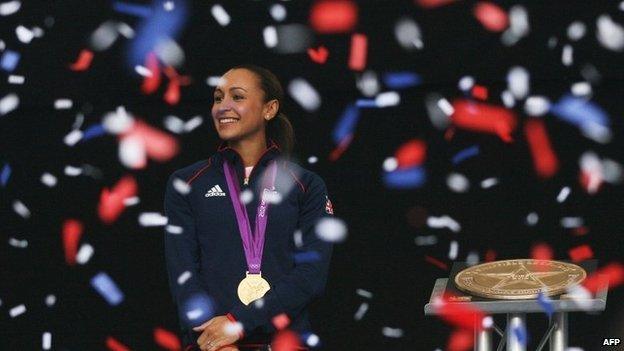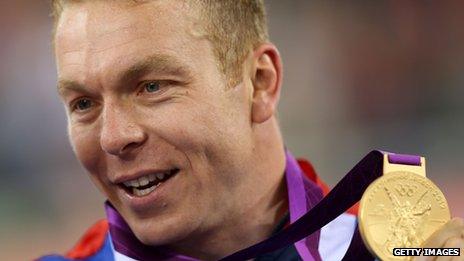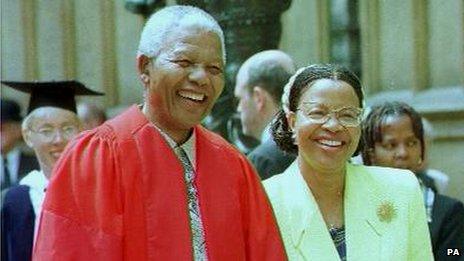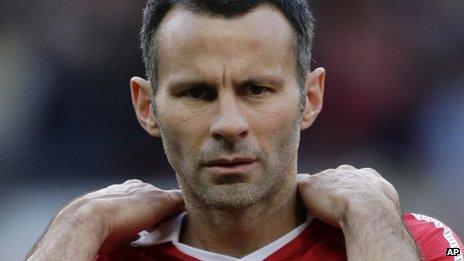Who, What, Why: Does freedom of the city allow you to graze sheep?
- Published

Jessica Ennis got a tickertape reception in Sheffield after winning gold in the heptathlon at London 2012
Olympians Sir Chris Hoy and Jessica Ennis are set to be given the freedom of their home cities. So what does it mean to be a freeman or freewoman?
Will Britain's most successful Olympian be able to graze his cattle on The Mound in Edinburgh?
Or if the gold medal-winning cyclist decides to ditch his bike and attempt to park his car for free on George Street, will he be "exempt for tolls and charges in the city", as freemen of the past would have been?
Similarly, if Ennis wants to use her freedom of Sheffield - expected to be approved on 5 September - to drive sheep through the centre of the city, will she be allowed?
The answer is no. The award is symbolic and grazing rights are not part of the modern freeman's privileges.
Hoy, who will get his freeman status on 16 September, would still expect a parking ticket from the Scottish capital's blue meanies.
So what use is being given the freedom of the city?
Philip Whiteman, from the Institute of Local Government Studies at the University of Birmingham, says it is "not dissimilar" to the Honours list awarded on behalf of the Queen.
"It is effectively the only way that a local authority can confer honours," he explains.
Dr Whiteman says the vote for a freeman would have to be a full council decision, requiring at least two-thirds to vote in favour.
He says this meant it would not be a party political honour, but more about "civic pride".

Sir Chris Hoy won two Olympic gold medals at the London Games
"Local government has come to be seen as a public service provider," he says.
"It is about getting the bins emptied efficiently. Local authorities these days have very little opportunity to express civic pride.
"The freeman system is one of the last vestiges of late 19th Century, early 20th Century local government."
Although royal boroughs, or burghs in Scotland, have been appointing freemen for hundreds of years, the entitlement to money and privilege had disappeared by the early 19th century.
The 1973 Local Government Act in Scotland allows for persons of distinction to be made "honorary freemen" in a council area.

Nelson Mandela is a freeman of many UK cities, including Oxford where he collected the honour in 1997
It helpfully adds that the title does not confer any rights or privileges and specifically rules out "grazing rights".
The equivalent act of Parliament in England and Wales also stresses that this is purely a "honorary" title, although it does not feel it necessary to rule out grazing sheep.
But you do get a certificate.
Earlier this year, Harry Potter author JK Rowling was given the freedom of the City of London.
"I am prouder than I can say to be given the freedom of the City, which, on top of all the known benefits - and few people realise this - entitles me to a free pint in the Leaky Cauldron and a ten Galleon voucher to spend in Diagon Alley," she joked.
She is one of many prominent UK figures to be honoured by the city, but Murray Craig, the clerk of the Chamberlain's Court at the City of London, says that this is a "symbolic" modern version of a tradition which began in the 13th Century as an "economic transaction".
"You would pay a fee or a fine and it would give you economic trading rights in the richest part of the kingdom," he says.
Craig describes it as a sort of "medieval quality control or trading standards".

Ryan Giggs was given the freedom of Salford in 2010
He says the apocryphal belief that it allows freemen the right to drive sheep and cattle over London Bridge probably comes from the exemption from tolls and charges given in the earlier times.
Traders could take their beasts over the bridge to Smithfield market and save themselves the cost of paying the toll.
The traditional freeman role died out after changes to the law in 1835 because of Victorian reform of monopolies and cartels.
Many of the City of London's livery companies still exist, says Craig, but they are now mainly involved in charity, education and fellowship.
The same is true of many cities such as Edinburgh or York.
They have awarded freeman status for hundreds of years, but it is a long time since it bestowed anything more than a parchment and a lunch in honour of an esteemed figure.
"Freedom of the city is the highest honour that the city of Edinburgh can bestow. It is symbolic of the esteem that the city holds that person," says a spokesman for City of Edinburgh Council.
Other people who have been given the freedom of the Scottish capital include the Queen, the Duke of Edinburgh, Sir Sean Connery, Nelson Mandela and Burmese democracy campaigner Aung San Suu Kyi.
Mandela and Suu Kyi have also been honoured by many other UK cities, including its central Scotland rival Glasgow.
As well as giving freedom of the city to the world's most respected pro-democracy fighters, Glasgow has also honoured its own sons, including Sir Alex Ferguson and Billy Connolly.
Salford is another city which has honoured Mandela.
Sporting success seems to be a good way of getting the honour, with Michael Vaughan becoming a freeman of Sheffield after he captained the England cricket team to the Ashes.
Other Sheffield freemen (which seems to apply to both male and female recipients) include Olympian Sebastian Coe, the man behind the London Olympics.
"For private individuals, it is purely ceremonial and does not carry with it any special rights or privileges nowadays," says a spokesman for Sheffield City Council.
Reporting by Steven Brocklehurst
- Published3 September 2012
- Published15 August 2012
- Published15 August 2012